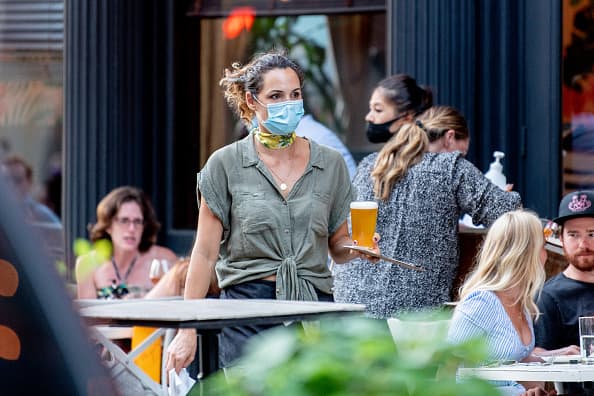Servers wear masks as musicians play in the street for patrons of the 1803 restaurant in lower Manhattan during phase 3 of the coronavirus pandemic on July 09, 2020 in New York.
Roy Rochlin | Getty Images
Surging coronavirus cases are showing up in both a slowdown of current economic activity as well as future plans, according to real-time data tracking things like job listings, dining out and vacations.
Restaurant traffic has plateaued after a quick rise when states began to reopen. Employers appear to be slowing in their attempts to fill open jobs. And an increasing number of people now say they will be staying home this summer, and even if they travel, most will do so by car rather than airplane.
“The state of the outbreak clearly still has the ability to influence economic outcomes,” said Ryan Preclaw, director of credit strategy at Barclays. “Economic damage appears to be spreading widely, regardless of where cases are concentrated.”
The latter point is important in that the bulk of the case surge has happened across four states: Arizona, California, Florida and Texas. Together, they accounted for just over half all the new cases reported Thursday, according to the COVID Tracking Project.
Seeing daily reports on the rising cases, regardless of their concentration, has pushed states across the country to reconsider their efforts to restart their economies. In particular, the hard-hit hospitality industry is facing rollbacks, and large gatherings continue to be restricted.
High-frequency data tracked by Barclays shows that road traffic “has been slower to recover” than in other parts of the world as Americans turn reluctant to get back to normal activities.
After consecutive months that saw payrolls increase a total 7.5 million, job listings have decreased and are nearly 20% below their level in February.
The leveling off of activity combined with the increase in virus cases “raises the possibility that a further acceleration in the national outbreak (and future restrictions in economic activity) may be on the horizon,” Preclaw said.
Indeed, Americans already appear to be retrenching on vacation activity.
Of 1,800 respondents to a recent Jefferies survey, 60% are planning on staying home this summer, up from 52% from the last reading in May. Of the group planning to go anywhere, 75% expect to drive, against 60% in May. Those who say they are going camping now number 3%.
Overall, the survey reflects an “increasing fear of heading out to shop or enjoy entertainment, a sharp drop in expected travel and less optimism around a 2020 return to work,” Jefferies researchers said in a note.
Respondents indicated 60% of workplaces had reopened, compared with 33% in May. However, 17% think they’ll be working from home until 2021 and 24% don’t think they’ll return to the workplace “for the foreseeable future.”
Frugality is another repercussion: About one-third said if they get another stimulus check, as is being discussed in Congress, they’ll either save it or pay down debt.
